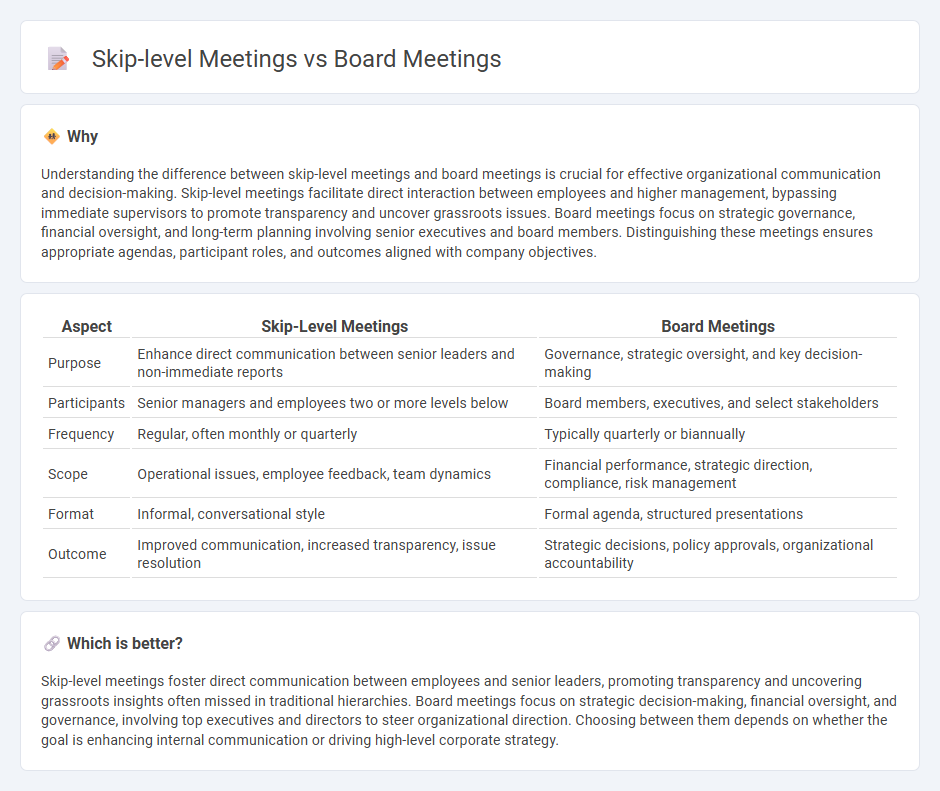
Skip-level meetings foster direct communication between employees and senior managers, bypassing intermediate supervisors to uncover insights and address concerns effectively. Board meetings involve strategic oversight by directors who evaluate organizational performance, set long-term goals, and ensure compliance with governance standards. Explore deeper distinctions and benefits of skip-level meetings versus board meetings to enhance your management approach.
Why it is important
Understanding the difference between skip-level meetings and board meetings is crucial for effective organizational communication and decision-making. Skip-level meetings facilitate direct interaction between employees and higher management, bypassing immediate supervisors to promote transparency and uncover grassroots issues. Board meetings focus on strategic governance, financial oversight, and long-term planning involving senior executives and board members. Distinguishing these meetings ensures appropriate agendas, participant roles, and outcomes aligned with company objectives.
Comparison Table
| Aspect | Skip-Level Meetings | Board Meetings |
|---|---|---|
| Purpose | Enhance direct communication between senior leaders and non-immediate reports | Governance, strategic oversight, and key decision-making |
| Participants | Senior managers and employees two or more levels below | Board members, executives, and select stakeholders |
| Frequency | Regular, often monthly or quarterly | Typically quarterly or biannually |
| Scope | Operational issues, employee feedback, team dynamics | Financial performance, strategic direction, compliance, risk management |
| Format | Informal, conversational style | Formal agenda, structured presentations |
| Outcome | Improved communication, increased transparency, issue resolution | Strategic decisions, policy approvals, organizational accountability |
Which is better?
Skip-level meetings foster direct communication between employees and senior leaders, promoting transparency and uncovering grassroots insights often missed in traditional hierarchies. Board meetings focus on strategic decision-making, financial oversight, and governance, involving top executives and directors to steer organizational direction. Choosing between them depends on whether the goal is enhancing internal communication or driving high-level corporate strategy.
Connection
Skip-level meetings enhance management transparency by enabling direct communication between senior leaders and frontline employees, providing firsthand insights that inform strategic decisions during board meetings. Data gathered from these interactions allows the board to assess organizational health, employee engagement, and operational challenges beyond middle management filters. Integrating skip-level meeting feedback into board discussions strengthens governance by aligning leadership perspectives with ground-level realities.
Key Terms
Board meetings: Governance, Strategy, Oversight
Board meetings play a crucial role in corporate governance by establishing policies, overseeing management, and ensuring strategic alignment with organizational goals. These meetings typically involve directors who review financial performance, assess risks, and make critical decisions to guide the company's long-term direction. Discover how board meetings impact organizational success and governance effectiveness.
Skip-level meetings: Communication, Engagement, Feedback
Skip-level meetings enhance communication by fostering direct dialogue between employees and higher management, bypassing immediate supervisors to uncover unfiltered insights. These meetings boost engagement by empowering staff, demonstrating that their opinions matter, and promoting transparency across organizational layers. Explore how implementing skip-level meetings can transform your workplace culture and improve leadership responsiveness.
**Board Meetings:**
Board meetings are formal gatherings where company directors review strategic decisions, financial performance, and compliance issues to ensure effective governance. These sessions prioritize transparency, accountability, and alignment with organizational goals while involving executives and key stakeholders. Discover how structured board meetings drive corporate success and regulatory adherence.
Source and External Links
Conducting Effective Board Meetings - This article provides insights into effective board meeting practices, including preparation strategies and roles within meetings to enhance productivity and engagement.
Meetings - Florida Board of Nursing - The Florida Board of Nursing meets bimonthly to address disciplinary cases, application reviews, and other necessary actions, with meetings open to the public.
Board Meetings - Federal Reserve Board - The Federal Reserve Board of Governors holds regular meetings, typically every other Monday, with some meetings open to the public under the Government in the Sunshine Act.
 dowidth.com
dowidth.com